February 7, 2020
How Wheaton used student and alumni feedback to beat the national graduate success average.
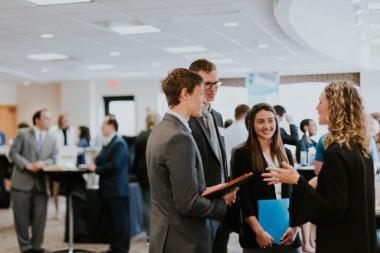 It’s a balmy day for September—at 80 degrees, it’s still warm enough to comfortably eat outside. Instead, more than 200 students in Wheaton College’s class of 2022 are filing into Coray Alumni Gymnasium holding plates loaded with smoky barbecue sandwiches, corn, and Rice Krispies treats.
It’s a balmy day for September—at 80 degrees, it’s still warm enough to comfortably eat outside. Instead, more than 200 students in Wheaton College’s class of 2022 are filing into Coray Alumni Gymnasium holding plates loaded with smoky barbecue sandwiches, corn, and Rice Krispies treats.
As they gather around tables with music thumping in the background, an observer might mistake the event for any other beginning-of-the year social.
It’s actually part of the College’s strategic plan to ensure these Wheaton students begin preparing for life after college during their sophomore year—a critical year for proactive decision-making.
Tonight’s dinner is the first in a series of events with the theme “Canvas: Framing Your Vocation and Career.” Now in its fifth year, Canvas is offered by Wheaton’s Center for Vocation and Career, which equips students to find professional and personal success in work and life.
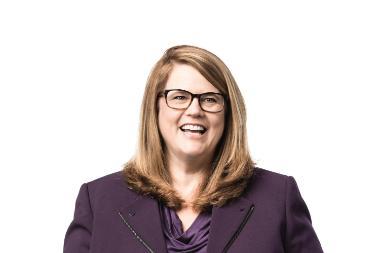 “Why the name Canvas? It’s a good visual for how to think about your life,” CVC director Dee Pierce M.A. ’17 explains to the students, gesturing toward artwork on the stage at the front of the gym. “Right now, you have a blank canvas as you think about the future. There is a lot you can create on this canvas that will be pleasing to God,” she continues. “Canvas is intended to give you a framework for making those choices.”
“Why the name Canvas? It’s a good visual for how to think about your life,” CVC director Dee Pierce M.A. ’17 explains to the students, gesturing toward artwork on the stage at the front of the gym. “Right now, you have a blank canvas as you think about the future. There is a lot you can create on this canvas that will be pleasing to God,” she continues. “Canvas is intended to give you a framework for making those choices.”
She pulls up a slide showing a pyramid that illustrates the progression of steps the CVC guides Wheaton students through during their four years on campus: “Know Yourself” is at the bottom, then “Explore Possibilities,” “Prepare,” and, at the top, “Land.”
“We want you to keep one foot firmly planted here at Wheaton,” Pierce says. “Making friends. Studying hard. Getting involved. Learning and growing in your vocation as students. But we are hoping you’ll take that other foot and plant it in an exploration of the future.”
Tonight, the students—all here voluntarily—will work through the MyStory workbook, a curriculum Pierce and her team designed to help them start thinking about their interests, skills and values.
Over the next few months, these sophomores will learn about the concept of a personal brand and how to communicate professionally via their LinkedIn profiles and elevator pitches. Juniors and seniors will debrief recent internship experiences with the sophomores, helping them understand what their own next steps might look like.
By the spring semester, many will choose a major and celebrate their decision at the College’s annual Declaration Dinner. Those who are still exploring will know what the CVC offers and how to connect with a career coach, who can offer guidance and support based on what they’ve learned so far.
“Why Are You Worrying About Job Stuff Now?”
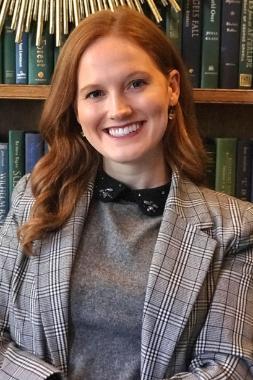 To young alumni like Grant Hensel ’15 and Anna Morris ’16, events like the Canvas series demonstrate a vital ramping up of Wheaton’s focus on career exploration.
To young alumni like Grant Hensel ’15 and Anna Morris ’16, events like the Canvas series demonstrate a vital ramping up of Wheaton’s focus on career exploration.
During their years on campus, Hensel and Morris were part of a group of friends he describes as “incredibly ambitious and career-oriented.” As early as freshman year, they had begun thinking about what career opportunities might come after Wheaton and how to best position themselves.
“We all cared a lot about using Wheaton as the launch pad to get into industry, which is where we thought we could help make a difference,” he says. Hensel, Morris and their friends used the College’s Wheaton in Network (WiN) platform to identify hubs of alumni in various cities who were willing to talk with students about their professional lives. Then, they planned networking trips to meet up with those alumni over fall and spring breaks.
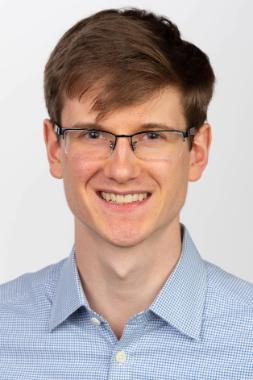 “It was a real ‘aha moment’ for me to realize that alumni are so willing to talk to students and very eager to support them,” Morris says.
“It was a real ‘aha moment’ for me to realize that alumni are so willing to talk to students and very eager to support them,” Morris says.
They recognized that many of their fellow students didn’t have the same proactive mindset—and suspected that they were missing out.
“Other students sort of thought we were crazy,” Hensel says. “Like, ‘Why are you worrying about job stuff now?’ But we knew that senior year would roll around, and we would not look so crazy. And everyone else would be going crazy, feeling like they’re trying to run a marathon and they only have 15 minutes to do it.”
In conversations with administrators—which Hensel recalls as “warmly received,” the students made their case that the current iteration of career development programming wasn’t sufficient.
“We saw a need for greater support for students to explore careers earlier in their Wheaton experience,” Morris says.
“A Restlessness About Improving”
By the time the students began expressing their need for better career services, the College had begun its own evaluation and was identifying opportunities to improve.
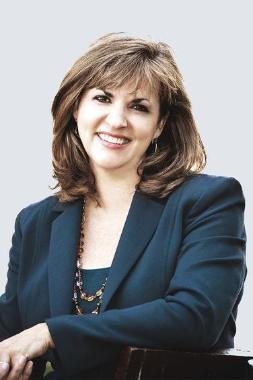 In her roles as Director of Alumni & Parent Relations and Executive Director of the College’s Alumni Association, Cindra Stackhouse Taetzsch ’82 worked closely with Wheaton’s Leadership Council, a volunteer group of dedicated alumni from various industries who had also expressed a need for the College to improve.
In her roles as Director of Alumni & Parent Relations and Executive Director of the College’s Alumni Association, Cindra Stackhouse Taetzsch ’82 worked closely with Wheaton’s Leadership Council, a volunteer group of dedicated alumni from various industries who had also expressed a need for the College to improve.
There was a disconnect between the world-class liberal arts education Wheaton provided and graduates’ preparedness for the marketplace. In the post-Great Recession economy, the College’s focus on resume and interview preparation, though important, wasn’t helping students network or providing them with the skills they needed to compete with graduates from other top-ranked schools.
“We have the best ‘product’ in the world. Wheaton produces students who will change the world for Christ,” Stackhouse Taetzsch says. “But many of them were taking a long time to figure out how to land and how to get started.”
Stackhouse Taetzsch began an intensive project of best practices research and identified several critical needs, including investing in staffing and a centralized location, making relevant career programming a mission-critical part of the Wheaton experience, and providing a clear roadmap for soon-to-be graduates.
Among the most important changes was moving the newly named Center for Vocation and Career from Student Development to the Advancement and Alumni Relations division, which was soon renamed the Advancement, Vocation, and Alumni Engagement Division. This allows the CVC to leverage the College’s relationships with alumni and parents who are positioned to provide career advice, connect students with internships, and make hiring decisions.
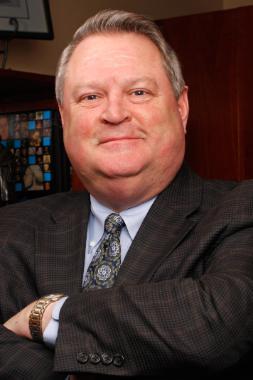 “Adding the CVC to this division was an inspired way to harness the energy and resources needed to make this important project flourish,” says Vice President for Advancement, Vocation, and Alumni Engagement Kirk Farney. “We set out to synergize our loyal alumni, our generous donors, and our knowledge of emerging marketplace trends in an initiative that we knew would enhance the success of our graduates.”
“Adding the CVC to this division was an inspired way to harness the energy and resources needed to make this important project flourish,” says Vice President for Advancement, Vocation, and Alumni Engagement Kirk Farney. “We set out to synergize our loyal alumni, our generous donors, and our knowledge of emerging marketplace trends in an initiative that we knew would enhance the success of our graduates.”
The College also added the CVC to its “From the Heart, For the Kingdom” campaign, raising funds for enhanced operations and a new location.
The next major move was the 2016 hire of Dee Pierce M.A. ’17 as CVC Director. Pierce, who worked in the political, non-profit, and corporate sectors before transitioning into higher education, further developed the comprehensive new vision.
“Dee brings amazing gifts of collaboration and vision, along with her expertise for tearing down silos, cultivating relationships with alumni and parents, and hiring good people. She brings a hunger and a restlessness about constantly improving,” Stackhouse Taetzsch says. “Her hire was pivotal.”
“From Aspiration to Notable Strength”
Within a year, Pierce had nearly doubled the size of the CVC team by hiring a group of trained career coaches who provide students with specialized, major-specific coaching. The coaches split their time between the CVC and their specific academic department, ensuring both students and faculty are familiar with the coaches and the resources they offer.
Wheaton students now begin exploring career possibilities early. First-year students take the CliftonStrengths assessment and then spend a Saturday morning with their friends exploring their Top 5 strengths with upper class students.
Helping students understand themselves and feel the freedom to explore various possibilities is key to Pierce’s mission. “There are a lot of students who have no idea what they want to do, and our programming helps them see the unique ways God has gifted them and the life experiences they’ve had that helped develop their interests, and then exposes them to ways to use those gifts in service to the kingdom,” Pierce says.
For others, the CVC helps students evaluate their preexisting ideas about themselves and their career goals.
“We say ‘OK, you want to be a doctor. Well, tell me why, and let’s make sure your thinking on that reflects good self-awareness, good exploration. So that when you do pursue that—and we can help you do that—you have a sense of why it’s the right choice,’” Pierce says.
The CVC helps students find and complete internships—even providing innovative scholarships that let many students pursue unpaid internships. Students have access to resources and coaching on job interviews and salary negotiations, and the Senior Series equips graduating students with budgeting essentials for life after Wheaton.
A major part of the CVC’s work is helping students build relationships with Wheaton’s alumni, who remain highly engaged, decades after graduation.
“Our alumni are incredible—their generosity knows no bounds,” Pierce says. “They never tell us no, which is wonderful.”
The CVC creates regular opportunities to foster relationships with alumni including interactive events like Taco Tuesdays, in which students meet with alumni in various fields over a taco dinner; Networking Night, where students mingle with local young alumni; and Externship Day, in which students visit alumni at their offices to learn about potential careers. Past participants include companies like Google, LinkedIn, Slalom Consulting, IBM and ministries like Compassion International.
Recognizing what can’t be measured can’t be managed, Pierce brings a strong orientation toward data and best practices. “We are really diligent about data,” she says. Everything is monitored, measured, and tracked, with an eye toward improvement. The annual Life After Wheaton report—which traces the career outcomes for the class of 2018—shows that 99 percent of graduates “landed,” meaning they are employed, interning, furthering their educations, or pursuing other adventures of their choice—within six months of graduation. That’s an increase of 8% over the previous year—and 15% higher than the national average of 84% in 2017.
Everything in the newly-renovated CVC offices—from the floor-to-ceiling glass windows, industrial design, high-tech interview spaces, and placement of the hospitality bar—is based on research.
The redesigned space is a warm, welcoming hangout, which is likely to increase student engagement and reduce anxiety about the future.
“Through the effective innovation of the leaders of the CVC and generous giving from Wheaton’s supporters, the CVC has been completely transformed,” says Wheaton College President Philip Ryken. “What had been an area of aspiration has become a notable strength. In fact, other schools are starting to come to Dee Pierce to learn more about Canvas and other innovative programs that enable us to excel in preparing our students for their first step after graduation, and all the steps that follow after that.”
“It’s Like a Matchmaker”
To Hensel and Morris, the CVC’s transformation is personally satisfying. Rather than merely identify the College’s need for improvement, they, and their group of ambitious friends, served on various student and alumni groups that helped envision a career center that would help future students demonstrate the value of a Christian liberal arts education in any industry.
Hensel—who acknowledges that he “ignored” the career center as a student—is now an effusive supporter.
“The CVC is like a matchmaker,” he says. “Now, when you walk in, you have the ability to be connected to all of these incredible opportunities, many of which you didn’t know existed, and many of which you now have an ‘in’ to because someone at the CVC has a relationship with someone who can give you an edge,” Hensel continues. “Now there is this enormous edge, which is wonderful.”
Morris, now an Account Manager at Amazon Web Services, has continued to be involved with the CVC. She estimates that she speaks with 50-60 Wheaton students about career planning annually.
“I love talking to and meeting students, because I was given that same gift from alumni who came before me,” she says. “I really encourage them to get to know the CVC ambassadors as early as they can. We truly have alumni in every facet and every industry, and they are almost always willing to connect with you. Wheaton has an incredible reach.”--LaTonya Taylor